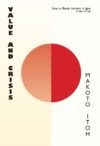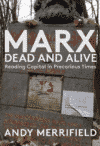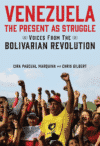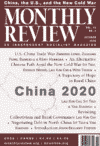Marxism

Marxist economic thought has had a long and distinguished history in Japan, dating back to the First World War. When interest in Marxist theory was virtually nonexistent in the United States, rival schools of thought in Japan emerged, and brilliant debates took place on Marx’s Capital and on capitalism as it was developing in Japan. Forty years ago, Makoto Itoh’s Value and Crisis began to chronicle these Japanese contributions to Marxist theory, discussing in particular views on Marx’s theories of value and crisis, and problems of Marx’s theory of market value. Now, in a second edition of his book, Itoh deepens his study of Marx’s theories of value and crisis, as an essential reference point from which to analyze the multiple crises that have arisen during the past four decades of neoliberalism. The promise of Marx’s theories has not waned. If anything—given the failure of Soviet-style socialism and the catastrophe of neoliberalism—it grows daily. | more…

In an interview with Alejandro Pedregal, John Bellamy Foster tells us about the paths great ecosocialist thinkers traveled, the most prominent debates in current Marxist ecological thought, and the urgent need for a project that transcends the conditions that threaten the existence of our planet today. | more…

Karl Marx saw the ruling class as a sorcerer, no longer able to control the ominous powers it has summoned from the netherworld. Today, in an age spawning the likes of Donald Trump and Boris Johnson, our society has never before been governed by so many conjuring tricks, with collusions and conspiracies, fake news and endless sleights of the economic and political hand. And yet, contends Andy Merrifield, as our modern lives become ever more mist-enveloped, the works of Marx can help us penetrate the fog. In Marx, Dead and Alive—a book that begins and ends beside Marx’s recently violated London graveside—Merrifield makes a spirited case for a critical thinker who can still offer people a route toward personal and social authenticity. | more…

In this issue of Monthly Review, we publish two articles marking the two-hundredth anniversary of the birth of Frederick Engels. In the attempt to address our planet’s ecological crisis, Engels’s work has once acquired a renewed importance. His analysis of the dialectics of nature was to play a formative role in the development of modern ecological and evolutionary views and is now being rediscovered in that context. | more…

Today, two hundred years after his birth, Frederick Engels can be seen as one of the foundational ecological thinkers of modern times. Engels’s contributions to our understanding of the overall ecological problem remain indispensable, rooted in his own deep inquiries into nature’s universal metabolism. It is because of the very comprehensiveness of his approach to the dialectic of nature and society that Engels’s work can help clarify the momentous challenges facing humanity in the Anthropocene epoch and the current age of planetary ecological crisis. | more…

In grasping emergent qualities and laws on various levels of organization of matter, dialectical theory employs its own conceptual structure, scientific language, and investigation method, and takes a categorially open-ended shape. In this context, Engels provides a remarkable illustration that not only argues for the interconnection and interpenetration of distinct spheres such as chemistry and biology, but also draws on a generative feature of self-organizing systems. | more…

In his book Chicano Communists and the Struggle for Social Justice, Enrique M. Buelna examines the life of Ralph Cuarón, a Mexican-American or Chicano seaman, furniture maker, father, husband, and lifelong activist who joined the Communist Party at age 19 during the Second World War. The Communist Party, however, largely ignored Mexican workers and local members were not pleased with his organizing of that segment of the working class. In the early twenty-first century, the Mexican question remained, although it became known as the “Latino question” after considerable immigration from Central America in the 1980s and ’90s. In their book The Latino Question: Politics, Labouring Classes, and the Next Left, Armando Ibarra, Alfredo Carlos, and Rodolfo D. Torres deconstruct the word Latino, arguing that it homogenizes an extremely diverse population. | more…

Venezuela has been the stuff of frontpage news extravaganzas, especially since the death of Hugo Chávez. With predictable bias, mainstream media focus on violent clashes between opposition and government, coup attempts, hyperinflation, U.S. sanctions, and massive immigration. What is less known, however, is the story of what the Venezuelan people—especially the Chavista masses—do and think in these times of social emergency. Denying us their stories comes at a high price to people everywhere, because the Chavista bases are the real motors of the Bolivarian revolution. This revolutionary grassroots movement still aspires to the communal path to socialism that Chávez refined in his last years. Venezuela, the Present as Struggle is an eloquent testament to their lives. | more…

This special issue of Monthly Review, “China 2020,” is the product of a long period of cooperation with critical Chinese Marxist scholars. This has resulted in an extensive series of articles on contemporary Chinese social and economic relations since 2012, to which most of the authors in the present issue have previously contributed. It takes on a special significance due to the growing conflict between the United States and China, making critical Marxist analysis in this area all the more important. | more…

Survival Bricolage of Zhoujiazhuang and Puhan Rural Community
Zhoujiazhuang and the Puhan Rural Community offer contrasting experiences of how communities in different parts of China have responded to, negotiated, and undergone extensive changes during the last forty years since the reform policy was implemented in the country in 1979. | more…

The Singularity of the Zhoujiazhuang People's Commune
Zhoujiazhuang is singular, being the only de facto people’s commune in China today. At present, Zhoujiazhuang still maintains the political, economic, and social structure that has been essentially in place since 1956. For over sixty years—since ten years before the Cultural Revolution and thirty-eight years after the dismantling of almost all people’s communes in 1982—Zhoujiazhuang has survived as an organizational unit over the same territory comprising the same six natural villages. | more…

The Making of Puhan Rural Community in North China
Originally set up in 1998 in China, the Puhan Rural Community was the first peasant-initiated, cross-village organization established after the collapse of the top-down people’s communes and the implementation of the household responsibility system. Puhan learned a lesson about the exploitation of usurious microfinance and decided that it was capable of establishing a system of mutual aid credit by itself, changing the cultural emphasis on money. Its story of struggling with rural financial organizations opens up a debate on the trap of marketization and monetization, the root causes of loans and debts, the negotiating power of collectives, the production mode of ecological agriculture, and the redefinition of the commonwealth. | more…











